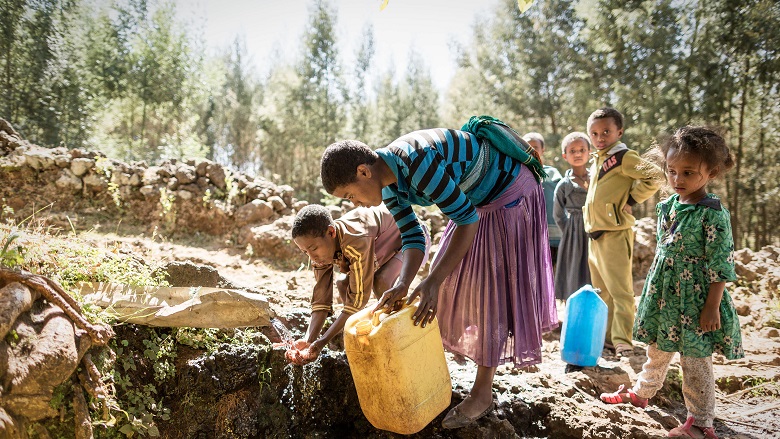Ethiopia is Africa’s fastest-growing economy. For a decade, it grew at more than 10% a year and this has contributed to significant development progress. Increasing access to safely managed water and sanitation can help sustain this progress and accelerate poverty reduction.
But economic growth in Ethiopia is a thirsty business and diminishing water supplies can translate into slowdowns and cloud economic prospects. Water touches every aspect of development. It is essential for food production, for example, and water and sanitation are critical to improving human capital outcomes such as reducing child mortality, tackling communicable diseases and increasing life expectancy.
That’s why Ethiopia is one of the Global Water Security & Sanitation Partnership (GWSP)’s priority countries, with specific and strategic investments. Simply put, Ethiopia is where some of the most impactful GWSP-supported innovative interventions and approaches are tested, refined and scaled-up.
Ethiopia successfully met its Millennium Development Goal (MDG) for drinking water supply ahead of 2015 but fell some way short of achieving its MDG target for sanitation. A key challenge in reaching Sustainable Development Goal (SDG) 6 is that few people have either safe in-house water access and or latrines with safely managed fecal waste.
‘Safely-managed water’, as defined by the SDGs, must be on premises, available when needed, and free from contamination. At present, only 63 percent and 4 percent are on premises in urban and rural areas respectively.
So GWSP is helping rural communities with the knowledge and knowhow they need to help maintain water facilities and expand access to water services. The World Bank’s Water GP is helping to establish supply chains for spare parts, procuring equipment and tools, and building local private operators’ capacity. In addition, a pilot is currently
underway to look at the viability of rural utilities working across village clusters to achieve economies of scale.
Open defecation is still practiced by 32 percent of Ethiopia’s rural population and 7 percent of urban households. Handwashing facilities are limited and fecal sludge management is also limited, particularly in rural areas. To reach the SDG 6 goal of 'sustainable and safely managed sanitation” it will be critical to develop city-wide holistic sanitation services in urban areas and off-site sanitation infrastructure in rural areas.
This is where the experiences fostered by GWSP can step in and provide support. The Partnership builds on decades of knowledge, learning and practical experience from the World Bank, the Water Partnership Program (WPP) and the Water and Sanitation Program (WSP). And WSP’s technical assistance was instrumental in helping the government of Ethiopia develop an integrated urban sanitation and hygiene strategy. This groundwork contributed to design improvements in a $445 million World Bank loan to improve existing onsite and sewer-based solutions, increase FSM services and expand decentralized wastewater treatment plants.
GWSP is now helping several cities implement the national strategy through the Citywide Inclusive Sanitation approach (CWIS) to ensure that fecal sludge is safely captured, transported and treated in urban areas. Over 20 utilities across the country were trained in the use of CWIS tools, materials and approaches for the design of urban sanitation interventions. The national and international advisors who support the government in implementing the project also received guidance on CWIS approaches and principles.
The GWSP’s five themes of institutions, inclusion, sustainability, resilience and finance inform all of its water and sanitation interventions in Ethiopia. To increase the capacity of institutions, GWSP support is helping establish training curricula in local colleges aimed at improving the operations and maintenance (O&M) and construction skills of local private operators, technicians, and artisans. Technical assistance is also being provided to help develop skills in sanitation marketing and behavior change.
The cost of constructing safely managed latrines is often prohibitive for women, the poor and other disadvantaged groups, putting inclusion at risk. To overcome this challenge, GWSP will help shape a $205 million Water, Sanitation and Hygiene Project so everyone, especially women, can have a seat at the table and a voice in the conversation. Mechanisms to improve transparency will be developed to ensure women’s participation in rural areas and small towns across nine regions.
Through its work on water, sanitation, institutions and inclusion, GWSP is helping strengthen even further the robust foundations of economic growth and human capital in Ethiopia.
